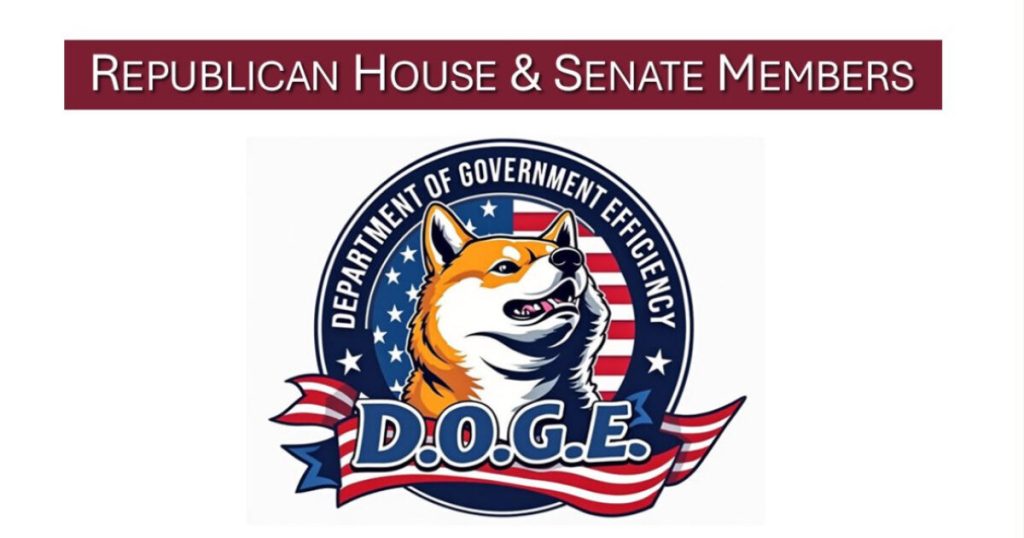

Trump’s Department of Government Efficiency (DOGE) co-leaders, Elon Musk and Vivek Ramaswamy, are scheduled to meet with Republican lawmakers on Capitol Hill Thursday to discuss the new program aimed at cutting government waste.
Last month, it was reported that Congressmen Aaron Bean (R-FL) and Pete Sessions (R-TX) launched a new congressional DOGE Caucus aimed at helping Musk and Ramaswamy accomplish their goals. Reps. Jeff Van Drew (R-NJ) and Ralph Norman (R-SC) have also joined the caucus. Even Democrat Representative Jared Moskowitz (D-FL) has reportedly agreed that “reducing ineffective government spending should not be a partisan issue,” vowing to join the Republican caucus.
Separately, Rep. Marjorie Taylor Greene (R-GA) plans to chair a DOGE House Oversight Subcommittee to “identify and investigate the waste, corruption, and absolutely useless parts of our federal government,” said Greene.
Senator Joni Ernst (R-IA) has also launched the Senate Doge Caucus. Senators John Cornyn (R-TX), Ted Budd (R-NC), Mike Lee (R-UT), Rick Scott (R-FL), Roger Marshall (R-KS), Eric Schmitt (R-MO), and James Lankford (R-OK) have signed on to join the new caucus.
House Speaker Mike Johnson (R-LA) shared a flyer for the meeting between Musk, Ramaswamy, and Republican House and Senate Members last week on X.
Johnson said they will discuss “major reform ideas to achieve regulatory rescissions, administrative reductions, and cost savings—& revive the principle of limited government,” crediting President Trump for making it possible.
Looking forward to hosting @elonmusk and @VivekGRamaswamy next week on Capitol Hill to discuss major reform ideas to achieve regulatory rescissions, administrative reductions, and cost savings—& revive the principle of limited government! @realDonaldTrump has made this possible! pic.twitter.com/kTedsu4Qas
— Speaker Mike Johnson (@SpeakerJohnson) November 27, 2024
President Trump announced that Musk and Ramaswamy will head the external advisory committee, which will “provide advice and guidance from outside of Government, and will partner with the White House and Office of Management & Budget to drive large scale structural reform, and create an entrepreneurial approach to Government never seen before.”
“Republican politicians have dreamed about the objectives of ‘DOGE’ for a very long time,” Trump said.
Indicating that the project will be finished by July 4, 2026, Trump added, “A smaller Government, with more efficiency and less bureaucracy, will be the perfect gift to America on the 250th Anniversary of The Declaration of Independence. I am confident they will succeed!”
In a recent op-ed in the Wall Street Journal, the two entrepreneurs laid out “The DOGE Plan to Reform Government.”
From their op-ed:
DOGE will work with legal experts embedded in government agencies, aided by advanced technology, to apply these rulings to federal regulations enacted by such agencies. DOGE will present this list of regulations to President Trump, who can, by executive action, immediately pause the enforcement of those regulations and initiate the process for review and rescission. This would liberate individuals and businesses from illicit regulations never passed by Congress and stimulate the U.S. economy.When the president nullifies thousands of such regulations, critics will allege executive overreach. In fact, it will be correcting the executive overreach of thousands of regulations promulgated by administrative fiat that were never authorized by Congress. The president owes lawmaking deference to Congress, not to bureaucrats deep within federal agencies. The use of executive orders to substitute for lawmaking by adding burdensome new rules is a constitutional affront, but the use of executive orders to roll back regulations that wrongly bypassed Congress is legitimate and necessary to comply with the Supreme Court’s recent mandates. And after those regulations are fully rescinded, a future president couldn’t simply flip the switch and revive them but would instead have to ask Congress to do so.A drastic reduction in federal regulations provides sound industrial logic for mass head-count reductions across the federal bureaucracy. DOGE intends to work with embedded appointees in agencies to identify the minimum number of employees required at an agency for it to perform its constitutionally permissible and statutorily mandated functions. The number of federal employees to cut should be at least proportionate to the number of federal regulations that are nullified: Not only are fewer employees required to enforce fewer regulations, but the agency would produce fewer regulations once its scope of authority is properly limited. Employees whose positions are eliminated deserve to be treated with respect, and DOGE’s goal is to help support their transition into the private sector. The president can use existing laws to give them incentives for early retirement and to make voluntary severance payments to facilitate a graceful exit.Conventional wisdom holds that statutory civil-service protections stop the president or even his political appointees from firing federal workers. The purpose of these protections is to protect employees from political retaliation. But the statute allows for “reductions in force” that don’t target specific employees. The statute further empowers the president to “prescribe rules governing the competitive service.” That power is broad. Previous presidents have used it to amend the civil service rules by executive order, and the Supreme Court has held—in Franklin v. Massachusetts (1992) and Collins v. Yellen (2021) that they weren’t constrained by the Administrative Procedures Act when they did so. With this authority, Mr. Trump can implement any number of “rules governing the competitive service” that would curtail administrative overgrowth, from large-scale firings to relocation of federal agencies out of the Washington area. Requiring federal employees to come to the office five days a week would result in a wave of voluntary terminations that we welcome: If federal employees don’t want to show up, American taxpayers shouldn’t pay them for the Covid-era privilege of staying home.Finally, we are focused on delivering cost savings for taxpayers. Skeptics question how much federal spending DOGE can tame through executive action alone. They point to the 1974 Impoundment Control Act, which stops the president from ceasing expenditures authorized by Congress. Mr. Trump has previously suggested this statute is unconstitutional, and we believe the current Supreme Court would likely side with him on this question. But even without relying on that view, DOGE will help end federal overspending by taking aim at the $500 billion plus in annual federal expenditures that are unauthorized by Congress or being used in ways that Congress never intended, from $535 million a year to the Corporation for Public Broadcasting and $1.5 billion for grants to international organizations to nearly $300 million to progressive groups like Planned Parenthood.
The Gateway Pundit will provide updates on Thursday’s meeting.
The post Department of Government Efficiency (DOGE) Heads Elon Musk and Vivek Ramaswamy to Address Members of Congress Thursday on Capitol Hill – GOP Lawmakers Form DOGE Caucus and DOGE Committee appeared first on The Gateway Pundit.







